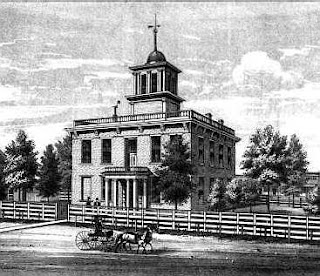He was a
learned minister, and he’d preached a lot of sermons, undoubtedly after
studying for a time on each occasion before sharing his messages with
believers. How do you think Jeremiah Rankin typically wished his hearers well,
at the conclusion of a sermon in 1880? It would have been very common for him
to do as his ancestor, the Apostle Paul (see a painting of him here), did many
times as he departed from the presence of various peoples. “God Be with You”
would have been one way to vocalize his thoughts and emotions, but there’s a
more ordinary way to express these words, a phrase that Jeremiah and others in
the 19th Century would have said instead. But, without knowing the
phrase’s origin, we can too glibly mutter these to our friends and family.
Words do have meaning.
Jeremiah
Rankin had said ‘good-bye’ by the time he was 52 innumerable times. Count the number
of locations in which he had lived, multiplied by the number of people to whom
he’d ministered or spoken, times the number of years he’d lived, and you might
arrive at a number approximating the number of times he’d said ‘good-bye’. Born
in New Hampshire, educated in Vermont and Massachusetts, Rankin was serving a
church and Howard University in Washington, D.C. as he entered his early 50s. It’s
said that he composed the eight verse-poem “God Be with You” as a result of
discovering the true meaning of the parting words most people utter without
thinking. Had he been studying one of the great apostle’s books, in which Paul
likewise wished for God’s presence to be with new converts upon his departure (Philippians.
4:9; 2 Corinthians. 13:11, 14; Romans. 15:33; 16:20)? Rankin apparently
composed the words for no particular occasion or people, but just wanted to underscore
the meaning of the words, and to enhance the singing service at the church.
Perhaps they needed a new song, and since Jeremiah had shown the ability to
craft other hymn texts (he wrote at least a few dozen in his lifetime), it was
not a surprise that “God Be with You” was the result. Would he have also spoken
about the etymology of the phrase and emphasized for his hearers their true
meaning, perhaps in a full-length sermon? His eight verses contained probably more
than enough material for such an exposition. Protection was one repeated theme
Jeremiah depicted in his poem. But, others emerge as well, like direction (v.1),
sustenance (v.2), purpose (v.3), reminders (v.5), healing presence (v.6),
saving power (v.7), and heavenly transport (v.8). He might have been a poet,
but he was also a preacher!
What do
I wish for someone as I depart from them? Does Jeremiah’s list cross my
thoughts? Sometimes, I admit, I just want to be away from someone as I leave,
so perhaps I should reconsider saying ‘good-bye’, or even just ‘bye’. After
all, if I don’t really wish for God’s presence and influence to remain with him
or her, I shouldn’t mouth such nice-sounding words. It’s an awesome thing to
have Him near – no, inside – me. To wish that for someone else is a
breathtaking thing. It doesn’t mean He leaves me, but yet He can join this acquaintance,
friend, or loved one. So, what need does this person have that God can fill?
Maybe it’s multiple needs that are in play. Jeremiah thought so, too.
See more
information on the song story in these sources: The Complete Book of
Hymns – Inspiring Stories About 600 Hymns and Praise Songs by William J.
Petersen and Ardythe Petersen, Tyndale House Publishers, 2006; Amazing
Grace: 366 Inspiring Hymn Stories for Daily Devotions by Kenneth W. Osbeck,
Kregel Publications, 1990; 101 More Hymn Stories, by Kenneth W. Osbeck,
Kregel Publications, 1985; Then Sings My Soul – 150 of the World’s Greatest
Hymn Stories, Robert J. Morgan, Thomas Nelson Publishers, 2003; and A
Treasury of Hymn Stories – Brief Biographies of 120 Hymnwriters with Their Best
Hymns, by Amos R. Wells, Baker Book House, 1945.
Also see this link, showing all eight original verses:





